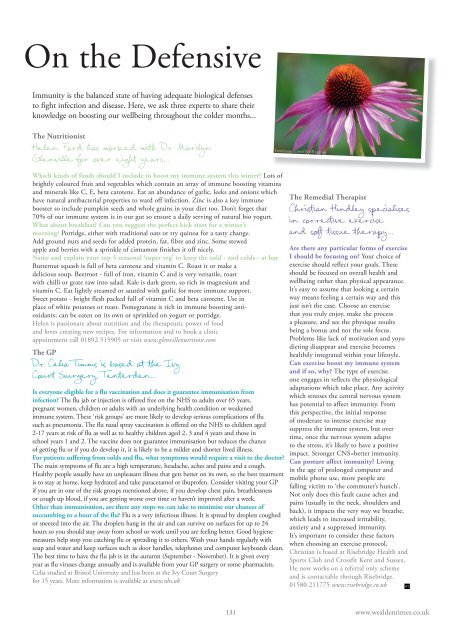Wealden Times | WT165 | November 2015 | Gift supplement inside
Wealden Times - The lifestyle magazine for the Weald
Wealden Times - The lifestyle magazine for the Weald
Create successful ePaper yourself
Turn your PDF publications into a flip-book with our unique Google optimized e-Paper software.
On the Defensive<br />
Immunity is the balanced state of having adequate biological defenses<br />
to fight infection and disease. Here, we ask three experts to share their<br />
knowledge on boosting our wellbeing throughout the colder months...<br />
The Nutritionist<br />
Helen Ford has worked with Dr Marilyn<br />
Glenville for over eight years...<br />
Freeimages.com/ViviRindom<br />
Which kinds of foods should I include to boost my immune system this winter? Lots of<br />
brightly coloured fruit and vegetables which contain an array of immune boosting vitamins<br />
and minerals like C, E, beta carotene. Eat an abundance of garlic, leeks and onions which<br />
have natural antibacterial properties to ward off infection. Zinc is also a key immune<br />
booster so include pumpkin seeds and whole grains in your diet too. Don’t forget that<br />
70% of our immune system is in our gut so ensure a daily serving of natural bio yogurt.<br />
What about breakfast? Can you suggest the perfect kick start for a winter’s<br />
morning? Porridge, either with traditional oats or try quinoa for a tasty change.<br />
Add ground nuts and seeds for added protein, fat, fibre and zinc. Some stewed<br />
apple and berries with a sprinkle of cinnamon finishes it off nicely.<br />
Name and explain your top 5 seasonal ‘super veg’ to keep the cold - and colds - at bay<br />
Butternut squash is full of beta carotene and vitamin C. Roast it or make a<br />
delicious soup. Beetroot - full of iron, vitamin C and is very versatile, roast<br />
with chilli or grate raw into salad. Kale is dark green, so rich in magnesium and<br />
vitamin C. Eat lightly steamed or sautéed with garlic for more immune support.<br />
Sweet potato - bright flesh packed full of vitamin C and beta carotene. Use in<br />
place of white potatoes or roast. Pomegranate is rich in immune boosting antioxidants;<br />
can be eaten on its own or sprinkled on yogurt or porridge.<br />
Helen is passionate about nutrition and the therapeutic power of food<br />
and loves creating new recipes. For information and to book a clinic<br />
appointment call 01892 515905 or visit www.glenvillenutrition.com<br />
The GP<br />
Dr Celia Timms is based at the Ivy<br />
Court Surgery, Tenterden...<br />
Is everyone eligible for a flu vaccination and does it guarantee immunisation from<br />
infection? The flu jab or injection is offered free on the NHS to adults over 65 years,<br />
pregnant women, children or adults with an underlying health condition or weakened<br />
immune system. These ‘risk groups’ are more likely to develop serious complications of flu<br />
such as pneumonia. The flu nasal spray vaccination is offered on the NHS to children aged<br />
2-17 years at risk of flu as well as to healthy children aged 2, 3 and 4 years and those in<br />
school years 1 and 2. The vaccine does not guarantee immunisation but reduces the chance<br />
of getting flu or if you do develop it, it is likely to be a milder and shorter lived illness.<br />
For patients suffering from colds and flu, what symptoms would require a visit to the doctor?<br />
The main symptoms of flu are a high temperature, headache, aches and pains and a cough.<br />
Healthy people usually have an unpleasant illness that gets better on its own, so the best treatment<br />
is to stay at home, keep hydrated and take paracetamol or ibuprofen. Consider visiting your GP<br />
if you are in one of the risk groups mentioned above, if you develop chest pain, breathlessness<br />
or cough up blood, if you are getting worse over time or haven’t improved after a week.<br />
Other than immunisation, are there any steps we can take to minimise our chances of<br />
succumbing to a bout of the flu? Flu is a very infectious illness. It is spread by droplets coughed<br />
or sneezed into the air. The droplets hang in the air and can survive on surfaces for up to 24<br />
hours so you should stay away from school or work until you are feeling better. Good hygiene<br />
measures help stop you catching flu or spreading it to others. Wash your hands regularly with<br />
soap and water and keep surfaces such as door handles, telephones and computer keyboards clean.<br />
The best time to have the flu jab is in the autumn (September - <strong>November</strong>). It is given every<br />
year as flu viruses change annually and is available from your GP surgery or some pharmacists.<br />
Celia studied at Bristol University and has been at the Ivy Court Surgery<br />
for 15 years. More information is available at www.nhs.uk<br />
The Remedial Therapist<br />
Christian Hindley specialises<br />
in corrective exercise<br />
and soft tissue therapy...<br />
Are there any particular forms of exercise<br />
I should be focusing on? Your choice of<br />
exercise should reflect your goals. These<br />
should be focused on overall health and<br />
wellbeing rather than physical appearance.<br />
It’s easy to assume that looking a certain<br />
way means feeling a certain way and this<br />
just isn’t the case. Choose an exercise<br />
that you truly enjoy, make the process<br />
a pleasure, and see the physique results<br />
being a bonus and not the sole focus.<br />
Problems like lack of motivation and yoyo<br />
dieting disappear and exercise becomes<br />
healthily integrated within your lifestyle.<br />
Can exercise boost my immune system<br />
and if so, why? The type of exercise<br />
one engages in reflects the physiological<br />
adaptations which take place. Any activity<br />
which stresses the central nervous system<br />
has potential to affect immunity. From<br />
this perspective, the initial response<br />
of moderate to intense exercise may<br />
suppress the immune system, but over<br />
time, once the nervous system adapts<br />
to the stress, it’s likely to have a positive<br />
impact. Stronger CNS=better immunity.<br />
Can posture affect immunity? Living<br />
in the age of prolonged computer and<br />
mobile phone use, more people are<br />
falling victim to ‘the commuter’s hunch’.<br />
Not only does this fault cause aches and<br />
pains (usually in the neck, shoulders and<br />
back), it impacts the very way we breathe,<br />
which leads to increased irritability,<br />
anxiety and a suppressed immunity.<br />
It’s important to consider these factors<br />
when choosing an exercise protocol.<br />
Christian is based at Risebridge Health and<br />
Sports Club and Crossfit Kent and Sussex.<br />
He now works on a referral only scheme<br />
and is contactable through Risebridge.<br />
01580 211775 www.risebridge.co.uk<br />
131 www.wealdentimes.co.uk


















